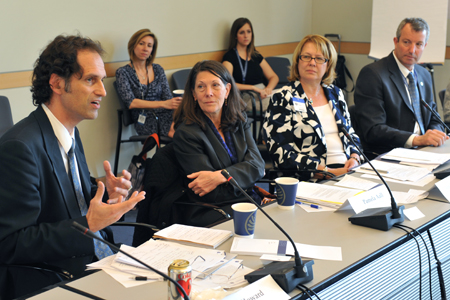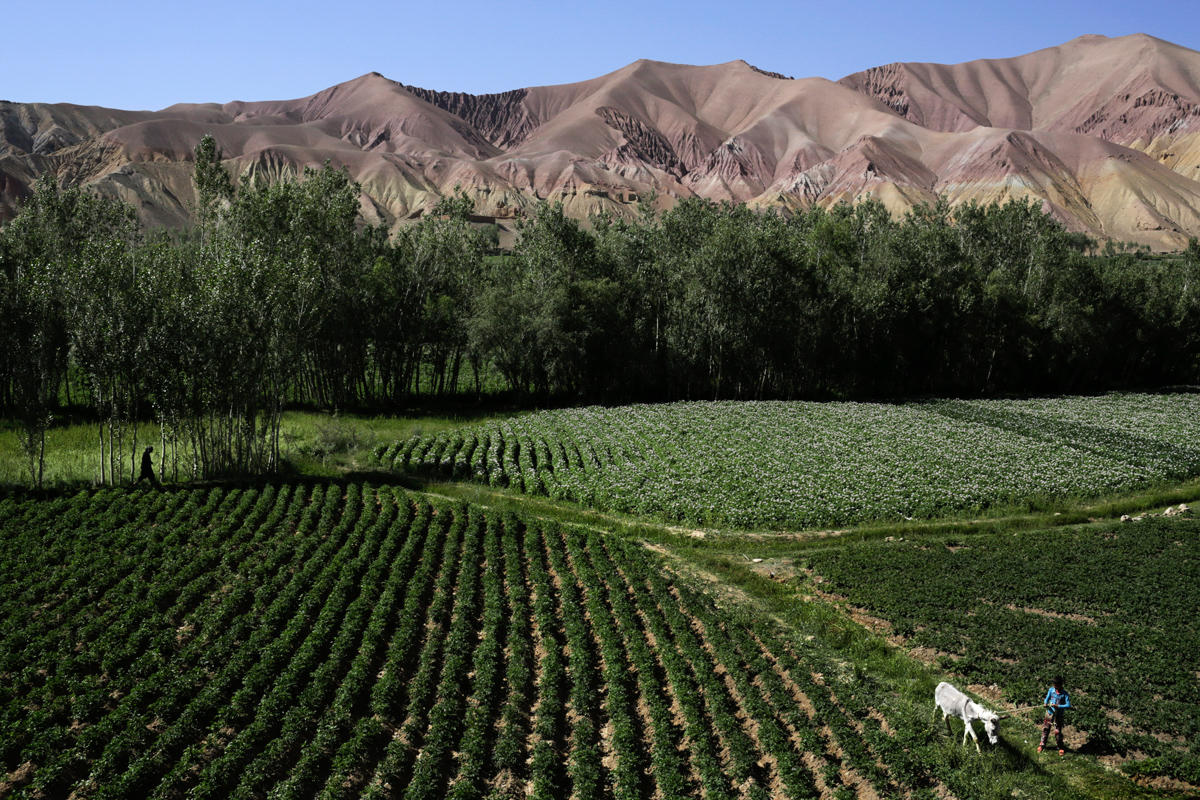With the National Academy of Engineering, the U.S. Institute of Peace (USIP) on May 1 hosted a workshop with specialists in and out of government on “Adapting Agricultural Extension to Peacebuilding.” The day-long roundtable examined an innovative concept—and potentially new dimension of peacebuilding and conflict management: conducting some of those activities through the wide-ranging networks of rural agricultural extension agents that are present in many fragile or conflict-ridden countries like Afghanistan and South Sudan, where USIP is active.
 (Pictured left to right: Andrew Robertson, Pamela Aall, Ann Bartuska, Ibrahim Shaqir)
(Pictured left to right: Andrew Robertson, Pamela Aall, Ann Bartuska, Ibrahim Shaqir)Ann Bartuska, the U.S. Department of Agriculture’s deputy under secretary for research, education and economics, said the workshop aimed to identify best practices linking conflict management and agricultural extension, as well as possible models for adapting extension work to encompass some peacebuilding efforts in the future. USIP’s
Pamela Aall, provost of its Academy for International Conflict Management and Peacebuilding, emphasized the complexity of conflicts in rural settings in opening the workshop.
Specialists noted that the core mission of agricultural extension is to convey practical knowhow to farmers. If extension agents are to take on peacebuilding activities, they might need specialized training, as well as more resources and communications technology. Agriculture ministries might also need partial reorganization. New security concerns would arise if extension agents delve into sensitive, non-agricultural issues.
And yet, those at the National Academy-USIP workshop expressed optimism about adding a new dimension to peacebuilding. Agricultural extension agents could serve in a “broker role” and as “a very user-friendly front doorway” for people looking for ways to reduce conflict, said Jon Unruh, an expert on post-conflict land and property rights with McGill University in Montreal. “We need an actor present in rural areas who’s part of the state but not part of the ‘bad’ state,” he said, referring to elements of state authority that are popularly viewed as corrupt or heavy-handed.
Caroline Hartzell, a political scientist at Gettysburg College and former Jennings Randolph senior fellow at USIP, noted the sometimes acute problems that come with resettling former fighters in the countryside. “A failure to reintegrate past combatants can actually pose huge problems,” she said.
Michael Jacobs, a research scientist in ecosystem science and management with Texas A&M who has been working in Afghanistan on conflicts involving nomadic herders, said, “I think there is a great opportunity with extension workers as long as they’re from the community, as long as they’re trusted.”
Some of the constraints that efforts to inject peacebuilding into extension operations abroad would face were highlighted by Jim Conley, a veteran American extension agent who is serving with the Agriculture Department’s Civilian Response Corps, most recently in turbulent Jonglei state in the new nation of South Sudan. He described a lack of budget, accountability and the academic connections that support extension activities in the United States. However, he suggested that extension agents could sound “early warning” of conflicts. David Nisbet, a research leader with USDA’s Agricultural Research Service, recalled his experience as an agricultural adviser as part of a provincial reconstruction team in Kerbala province in Iraq in 2009-10. In Iraq, he said, extension agents could face immediate danger if they moved into non-farming issues. Referring to one particularly effective extension representative, Nisbet said, “If he had gotten involved in local issues outside of agriculture, he would not have returned home that night.”
USIP and its roundtable partners are planning to continue work in the area, including potentially implementing a pilot project based on a core peacebuilding curriculum, says
Andrew Robertson, a senior program officer at USIP in its
Center for Science, Technology and Peacebuilding. “I believe extension presents a powerful possibility to stabilize societies simply because of the sheer scale of extension operations,” he said in an interview. “There is a growing consensus that development without tending to conflict is a waste.”
The May 1 workshop is part of a wider
partnership between USIP and the National Academy of Engineering. In the coming months, it will hold workshops to address other pressing problems in peacebuilding that may have scientific or technological solutions.
Explore Further





